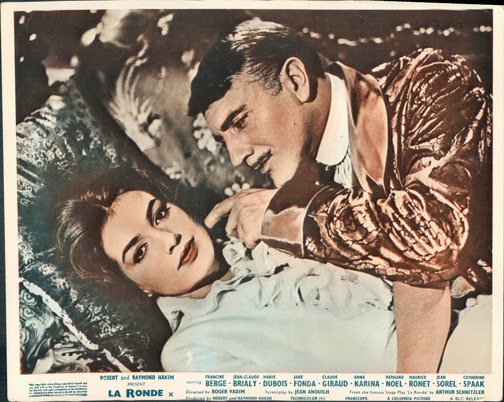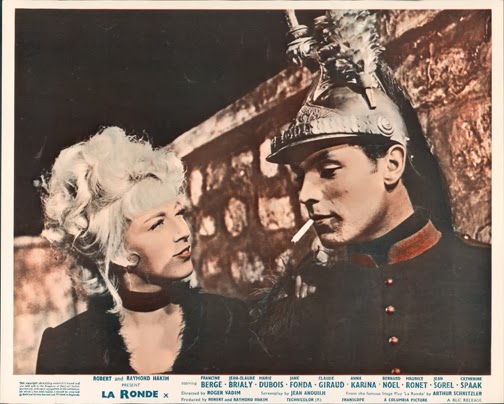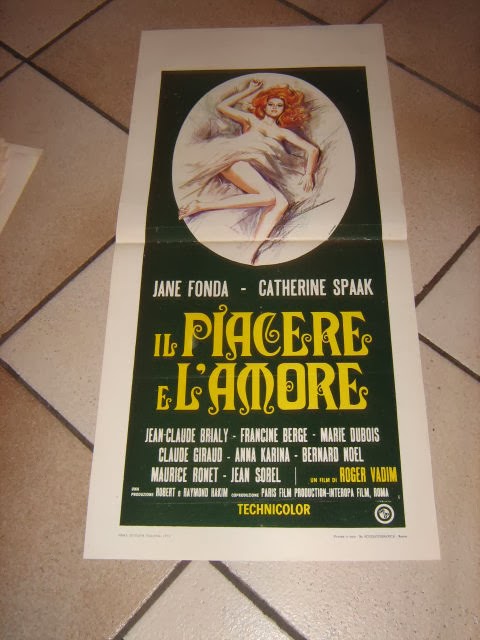U.S. One Sheet Poster
La ronde, a French period piece set in 1914 and directed by Roger Vadim, is a film about sex. It was the second French film version of a famous Arthur Schnitzler play, the previous film version having been done in 1950. The film starts as a soldier has a brief encounter with a prostitute and proceeds with the soldier having another encounter with a different woman, starting a chain that carries the story from one sexual encounter to another until ultimately a different soldier has an encounter with the prostitute from the film's opening scene, thus completing the circle. As each sexual encounter is about to be consummated, the film cuts to the point immediately after the act has been completed. If it were to be rated for a U.S. release today, I expect it would get a PG-13 rating, for adult themes.
In addition to Catherine, the film features Jane Fonda and a number of well-known European actors, including Anna Karina, Jean-Claude Brialy, Maurice Ronet, and Jean Sorel. Catherine's sequence begins at about the 58-minute mark and runs for approximately 26 minutes. She plays a 19-year-old young woman who has been picked up by a married man and has a sexual encounter with him in a private parlor. He says that he wants to continue an affair with her, but he does not want her to see other men. He cautions her to avoid talking to men who approach her on the street, so of course she carries on the circle of love by allowing herself to be picked up by a stranger on the street as she is browsing shop windows. The stranger is a playwright, and he uses that fact to get her into bed, telling her that he can land her a stage role. We then see that she is attending a play, imagining that she is the star, but instead the star is another of the playwright's lovers. Catherine's character is in attendance with an older man, who promises that he will buy her a theater.
Catherine holds her own among the stars in the film. Her performance is solid. With that said, I am not fond of this film. I generally like Italian films of the era better than French films, and I am not a fan of period pieces. This film definitely has a French feel to it. I did not find it humorous, nor did I find the stories interesting. I feel sure that this project was intriguing to Catherine, because it gave her a chance to work in Paris with Vadim and some well-known actors in a film that was likely to receive a lot of international attention, but I would classify it as a "miss" for her career. It certainly does not rank among her classic films. In fact, I would rank The Little Nuns ahead of La ronde.
Catherine appears to have been disappointed in the project. In her 1966 interview with Rex Reed, Catherine commented on Roger Vadim by saying: "I worked for him in 'La Ronde.' He was very interested in Jane Fonda, so he paid no attention to me. Everyone suffered." (Vadim subsequently married Fonda on August 14, 1965).
Catherine appears to have been disappointed in the project. In her 1966 interview with Rex Reed, Catherine commented on Roger Vadim by saying: "I worked for him in 'La Ronde.' He was very interested in Jane Fonda, so he paid no attention to me. Everyone suffered." (Vadim subsequently married Fonda on August 14, 1965).
It appears that Catherine's work for the film was done in February in Paris. In a subsequent post, I will include a press photo with a snipe indicating that it shows Catherine arriving in Paris for work on La Ronde (and the photo is stamped February 11, 1964). The April 15, 1964 issue of Variety reported "Roger Vadim winding La Ronde." During April, Catherine was in the U.S. to promote The Empty Canvas and to discuss possible future deals in Hollywood. The May 6, 1964 edition of Variety reported from Rome that Catherine was back from the States. The July 1, 1964 issue of Variety reported from Rome that "Catherine Spaak back from Paris and readying stint in 'Per Tre Notti D'Amore' (For Three Nights of Love)." It is also possible that she may have worked on the film in May and/or June.
La Ronde was nominated for a Golden Globe for Best Foreign-Language Film but lost to Juliet of the Spirits.
The film premiered in France on October 16, 1964, in the U.S. (as Circle of Love) on March 24, 1965, and in Italy (as Il piacere e l'amore) on September 15, 1965. It appears to have done respectable business at the U.S. box office, since it was reported as a "top hit" by Boxoffice for the Spring quarter (with a score of 153; 120 or above was required for a top hit; The Sound of Music had the top score at 285).
The film was distributed in the U.S. by Walter-Reade Sterling, Inc., Continental Distributing Division in an English dubbed version (Note: Kino Video released the film on DVD in the U.S. in 2005 in a French language version with English subtitles. My assumption is that this version is superior to the dubbed version released theatrically in the U.S.). Walter-Reade owned the DeMille and the Coronet theaters in New York City, where the film had its U.S. premiere. Here is a photo of the outside of the Demille in 1964 (photo taken by Robert Juzefski and displayed at cinematreasures.org):
Here's a view of the balcony inside:
Originally built in 1910, and having undergone several name changes through the years, the DeMille was one of the last Times Square movie houses to close.
The Coronet was a popular theater in the 1960's and 1970's on New York's upper east side. It closed in 2001 and has since been demolished. Here are some pictures of The Coronet from 1963:
Here is a print ad for the film's New York premiere:
In the April 19, 1965 issue, Boxoffice did not give the film a very positive review, noting:
"While Miss Fonda and the dubbed-English voices for the others make it acceptable for general bookings, Vadim's cheapened version, despite a screenplay by Jean Anouilh, has excessive nudity in its half-dozen bedroom episodes and is advertised 'No one under 16 admitted even if accompanied by an adult,' which certainly will attract sensation-seeking adults. It's better suited to exploitation spots than to specialty houses where devotees of foreign fare will compare it unfavorably to the Ophuls version. The succession of amorous episodes, as the various love partners discuss sex at great length, soon become repetitious with those involving Miss Fonda...being the best, especially as Jean-Claude Brialy and Maurice Ronet act with such aplomb. Eastman Color is a great asset."
In the April 9, 1965 edition, Time called the film a "racy, juvenile, artfully photographed peep show." Time criticized the dubbing and Vadim's approach to the subject matter, but ultimately concludes:
"Despite serious shortcomings, Circle of Love is worth seeing if only for its breathtaking color decor. The...film glows in red, green and golden wash of art-nouveau elegance. Against such sumptuousness, Vadim's elementary lechery seems to be the only thing out of place."
Although Catherine has as much screen time in the film as Jane Fonda and was probably at least as big a star internationally as Fonda at the time, you would not know it based on the U.S. release of the film. All of the promotional material emphasizes Fonda, and all of the pressbook articles revolve around Fonda. Catherine is only mentioned in-so-far-as she is listed as one of the film's ensemble of stars. Here is the front and back of the U.S. pressbook:
The U.S. one sheet poster is shown at the top of this post. Here is the half sheet poster (I have never come across the 40 x 60 poster):
Here is a U.S. subway poster (courtesy of the archives at emovieposter.com):
Here are 7 of the 8 U.S. lobby cards courtesy of the archives at emovieposter.com (Catherine is featured in the 3rd card down on the left and the 2nd card down on the right):
Some additional U.S. stills:
Some foreign stills featuring Catherine:
Some British lobby cards:
Italian material (two large posters, two locandina posters, fotobustas, and a postcard):
German soundtrack album, posters, programs, and lobby cards:
French posters (courtesy of the archives at emovieposter.com) and lobby cards:
A Yugoslavian poster (courtesy of the archives at emovieposter.com):
A Danish poster (courtesy of the archives at emovieposter.com):






.jpg)
.jpg)





.jpg)
.jpg)
.JPG)
.jpg)
.jpg)






















































No comments:
Post a Comment